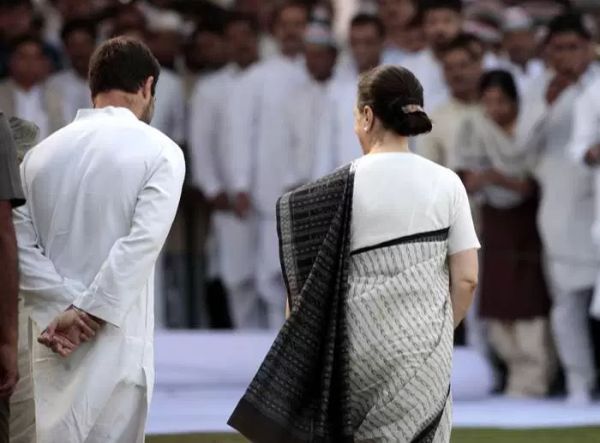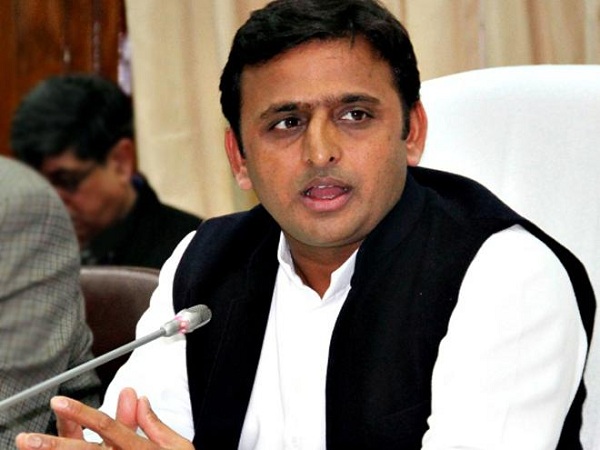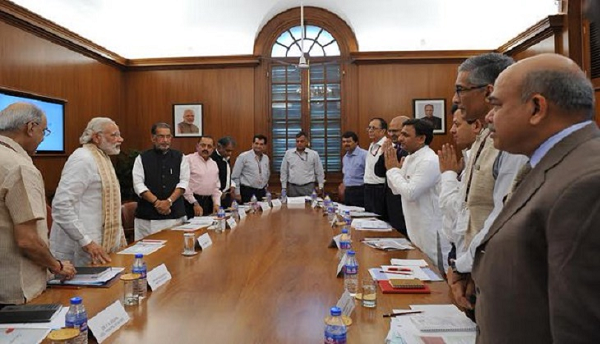
by Editor | May 25, 2021 | Opinions, Politics
 By Amulya Ganguli,
By Amulya Ganguli,
After the hug and the wink, a step back. The Congress’s realisation, albeit belatedly, that Rahul Gandhi still does not have the gravitas required to become the prime minister will be generally welcomed. Evidently, the party is becoming more mature along with its president.
The retreat by Rahul Gandhi in favour of regional leaders will enable the opposition at the national level to focus more effectively on the issue, which is just as well because of the number of aspirants.
As the Rashtriya Janata Dal’s (RJD) Tejashwi Yadav has said, there are at least four in the fray (apart from Rahul) — Mamata Banerjee, Mayawati, Chandrababu Naidu and Sharad Pawar. Mercifully, no one takes Arvind Kejriwal’s name any more, not even the Delhi chief minister himself.
Of the four, the West Bengal chief minister and the former U.P. chief minister can be regarded as front-runners. Both have made their intentions clear and are trying, for each of their parties, to win as many Lok Sabha seats as possible to buttress their claims.
The Trinamool Congress leader’s aim is to win all the 42 parliamentary seats in West Bengal. Since her party has 34 at present, her expectations cannot be said to be too high. However, winning all the Lok Sabha constituencies will not be easy at a time when the Bharatiya Janata Party (BJP) is seemingly gaining ground because of the prevailing lawlessness in the state which was seen during the recent panchayat polls.
As for Mayawati, her desire to have a nationwide alliance with the Congress and not in Madhya Pradesh alone, as the latter wants, is obviously intended to widen the prospect of her outfit, the Bahujan Samaj Party (BSP), winning a fair number of seats. At present, the BSP has none in the Lok Sabha, but that is an oddity – a one-time failure which does not portend the future.
However, what the chasing of seats emphasises is the importance of the numbers game, which, of course, is the central feature of a parliamentary democracy.
In this respect, the Telugu Desam with 16 seats and the Nationalist Congress Party (NCP) with seven may be theoretically ahead of the BSP. But they have several disadvantages.
For a start, as a south Indian party, the Telugu Desam may find the going tough in a political milieu where north Indian parties tend to be well ahead of those from elsewhere in terms of the popular perception about their successful strike rate. The reasons are, first, their fluency in Hindi which is understood nearly all over India, and, secondly, because, historically, north Indian politicians have dominated the corridors of power in New Delhi.
There has been only one prime minister from the south — H.D. Deve Gowda of Karnataka — but for only 10 months. The Telugu Desam leader, Chandrababu Naidu, will be hoping against hope, therefore, if he thinks that it will be an easy ride to Delhi’s 7, Lok Kalyan Marg (formerly Race Course Road), which is the prime minister’s official residence.
The NCP’s Sharad Pawar is another claimant although he has never said so himself; nor has Naidu. But though now an elder statesman, the 78-year-old Pawar, who became chief minister of Maharashtra at the age of 38, and has held a number of major portfolios at the centre, is now past his prime.
That leaves the two women — Mamata Banerjee and Mayawati. Before considering their cases, it has to be remembered that the last word may not have been said about Rahul. If the Congress sweeps the Rajasthan and Madhya Pradesh assembly elections and does fairly well in Chhattisgarh, it would have overcome much of the ignominy of its present lowly status in the Lok Sabha with 48 seats and think of taking on the BJP almost on equal terms in 2019. Such a turn of events will make Rahul a serious contender once again.
The problem with Mamata Banerjee and Mayawati is that they do not have an across-the-board, pan-Indian appeal. Both are largely based in their own states — West Bengal and U.P. — with Mamata suffering from the added disadvantage of being less than fluent in Hindi.
Mayawati may attract the Dalit and Muslim votes, but how enthusiastic the backward castes and the upper castes will be at the national level is open to question. In U.P., the Samajwadi Party leader, Akhilesh Yadav, may ensure that his ally, Mayawati, gets the backward caste votes, but she may face difficulties elsewhere because the Dalits and the backward castes have not always had the best of relations. The upper castes, of course, are even more opposed to the Dalits.
It is understandable, therefore, why the non-BJP parties have kept their options open about the prime ministerial candidate till after the elections. Their hope is that the numbers will be the decisive factor and make the choice for them. But there is also the need for those not in the running like Sonia Gandhi to play a mediatory role of the kind Jayaprakash Narayan and J.B. Kripalani played in 1977 to calm tempers and massage the egos.
(Amulya Ganguli is a political analyst. The views expressed are personal. He can be reached at amulyaganguli@gmail.com)
—IANS

by Editor | May 25, 2021 | Interviews
 By Mohit Dubey,
By Mohit Dubey,
Lucknow : Notwithstanding the speculation on the durability of the new-found alliance with one-time rival BSP, Samajwadi Party chief and former Uttar Pradesh Chief Minister Akhilesh Yadav says the 23-year-old acrimony with Mayawati and her party “is a thing of past”.
“All that is irrelevant now is that both parties are walking ahead, hand in hand, to achieve a larger national objective of defeating the Bharatiya Janata Party (BJP), which is detrimental to both the state and the nation,” Yadav said in an interview to IANS.
In a detailed interview after the stunning defeat the Samajwadi Party dealt to the BJP by trouncing it in Gorakhpur and Phulpur Lok Sabha byelections, seats held earlier by Chief Minister Yogi Adityanath and his deputy Keshav Prasad Maurya, Yadav said that the BSP-SP combine was like a “glue which will knock the daylights off the arrogant and useless BJP government”.
The BJP, the 44-year-old leader added, would often ridicule how the opposition had no narrative to take on the saffron camp. He pointed out that with the coming together of the BSP and SP, the narrative had finally arrived.
What about the bitterness that enveloped the relations between Mayawati and his own father, Mulayam Singh Yadav, particularly after the attack on her?
“The past is past. I look ahead. Mayawatiji has set the record straight that when this incident happened I was nowhere in politics and hence I cannot be drawn into the slugfest.”
Dropping enough hints that the BSP-SP bonhomie would continue till the 2019 Lok Sabha polls when Prime Minister Narendra Modi will seek another term for his government, the former Chief Minister said his party already had the development plank and now what it was doing was to emulate the BJP in micro-booth and caste management.
Asked about the mercurial nature of the Dalit diva Mayawati, he said that time changes people.
“Seat sharing are small things and they will be sorted out at the time it is needed. We will cross the bridge when we come to it.”
Akhilesh Yadav said he was now doing what the BJP had taught them.
“They talk of panna pramukhs, understanding and adjusting the caste matrix and focussing on booth management. Now when we do it, we are accused of being casteist… How can it be win-win for the BJP?”
After the Lok Sabha byelection victories, Akhilesh Yadav drove to Bahujan Samaj Party leader Mayawati’s residence for a 30-minute meeting.
He said Mayawati was warm and bore no signs of rivalry or bitterness. “She was welcoming. She took me on a pictorial tour of her journey from a commoner to being Chief Minister four times of the country’s most populous state.”
Akhilesh Yadav accused the Yogi Adityanath government of doing nothing in Uttar Pradesh in the past one year as compared to the “exemplary development” under his watch.
“The only thing the BJP government has done in the past one year is to cut ribbons of projects that were initiated by the SP government.”
Getting philosophical, he recounted how having studied in a military school at Dhaulpur in Rajasthan and later in Bengaluru, he had forgotten he was a backward-caste person.
“I almost forgot it until the BJP reminded me of my backward caste DNA. I am thankful to them for doing so. I would like to say that I may be born in a backward family, but I am a forward looking person who is progressive, has a vision and is growth-oriented.”
He listed many failures of the state government while calling the BJP confused and jittery.
He pointed out how they were trying desperately to find an answer to the coming together of the BSP and SP.
Asked if he planned for more parties to join them in a grand alliance, he said: “As of now it is just UP and the BSP-SP together.” His relationships with the Congress, he said, were normal and cordial.
(Mohit Dubey can be contacted at mohit.d@ians.in)
—IANS

by Editor | May 25, 2021 | News, Politics

Akhilesh Yadav
By Mohit Dubey,
Lucknow : Banished into political hibernation after a humiliating drubbing in the 2017 assembly elections, the Samajwadi Party (SP) of late seems to have got its voice and bearings back, led by its young leader and party chief, former Chief Minister Akhilesh Yadav.
After a gap of almost 10 months, the Yadav scion has, in the past one month, not only been vocal in his criticism of the Yogi Adityanath government but has also established the “missing connect” with party cadres, specially the youth.
Reduced to 47 in a 403-member assembly, the SP has been struggling to remain centre-stage even as the 325-member-strong Bharatiya Janata Party (BJP) gallops from one electoral victory to another in the state. Akhilesh has been meeting party workers from every nook and corner of the state in the past few weeks for their feedback on what went wrong in the assembly polls where its numbers shrank from a high of 224.
He has also begun work on setting the caste combinations and demographic arithmetic right. Party insiders say that “bhaiyya-ji” — as he is fondly called by his followers — has decided to stop sulking at the electoral losses and rather garner strength to take on the BJP’s might with renewed vigour. Yadav is said to have worked the wires with opposition party leaders in December 2017, trying to forge a front that could collectively counter the BJP’s might.
This came as a surprise to many, mostly those who think Akhilesh Yadav is hesitant in getting off the high horse and getting into “realistic” politics of “some sense, camaraderie”. Yadav not only initiated a process where opposition party leaders were brought on the same page against what the SP terms as manipulation of the electronic voting machines (EVMs) but has also authorised state party leaders to begin similar talks with like-minded leaders and legilsators in other parties.
“We are trying to take the help of all parties in exposing the BJP,” state spokesman and former minister Rajendra Chowdhary said. Yadav himself has pointed out that he has “understood the game of the BJP” and would now “take on the electoral war of the BJP in their own style”.
“Loha, lohe ko katta hai, ab hum Bhajpa ko usi ki bhasha mein samjhayenge (in a battle of equals, the BJP will be paid back in its own coin)”, Yadav declared at a recent presser.
The SP is already admitting in its fold leaders of various castes like Nishads, Thakurs and Brahmins — and a lot of Muslims have also returned to the party in the past few weeks. The party has so far distanced itself from the Congress and is focussing on rebuilding its cadre and boosting the morale of the crestfallen faithful. But is this enough? Opinion is divided.
While political observers see a shift in Akhilesh’s attitude of late and view it as a welcome sign that he is trying to unite the opposition forces and simultaneously rebuild the SP, they feel a sustained campaign against the BJP government, both at the centre and the state, is the need of the hour. Reining in the lumpen cadre in the party is another challenge. At a recent press conference, his cadres took over the auditorium, forcing journalists to leave in a huff.
Akhilesh finally apologised for the unruly behaviour of his party cadres. Clearly, he realises the pitfalls of being caught in the old image of the party. Now, time will tell how much he can change his own party, make it battle ready and challenge the might of the so far unstoppable BJP.
(Mohit Dubey can be contacted at mohit.d@ians.in)
—IANS

by Editor | May 25, 2021 | News, Politics

Akhilesh Yadav
Agra : Former Uttar Pradesh Chief Minister Akhilesh Yadav was on Thursday re-elected unopposed as the national president of the Samajwadi Party (SP) for a five-year term.
The party national executive met here for the 10th convention and elected the 44-year-old for another term.
The executive members also amended the party constitution to make the term of president five years from the present three years.
Akhilesh Yadav’s election was announced by party general secretary and Rajya Sabha member Ram Gopal Yadav, who was also the election officer for the post.
The re-election of Akhilesh Yadav means that he will now spearhead the party campaign in the 2019 Lok Sabha and 2022 state assembly elections.
Akhilesh Yadav was earlier elected as party president, replacing his father and founder of SP Mulayam Singh Yadav, on January 1 this year at an emergency national convention. Both Mulayam Singh and his brother Shivpal Singh Yadav did not turn up for the 10th national convention of the party on Thursday though both had been invited.
There were indications of some thaw in the frigid relations between the warring father and son earlier this week when Akhilesh drove to his father’s residence next door and invited him for the national convention. He later also telephonically spoke to his estranged uncle Shivpal Singh Yadav on Wednesday evening, after nine months, to invite him for the party meet. Shivpal reciprocated by extending his blessings for his second term as party president.
But the fact that both Mulayam and Shivpal chose to skip the crucial meet in Agra suggests that all is still not well within the SP and the Yadav clan.
—IANS

by Editor | May 25, 2021 | Economy, News
 New Delhi (IANS) A day after the Samajwadi Party (SP) accused the Bharatiya Janata Party (BJP) of sending an empty water train to drought-hit Budelkhand region, Uttar Pradesh Chief Minister Akhilesh Yadav on Saturday met Prime Minister Narendra Modi to discuss the water crisis situation.
New Delhi (IANS) A day after the Samajwadi Party (SP) accused the Bharatiya Janata Party (BJP) of sending an empty water train to drought-hit Budelkhand region, Uttar Pradesh Chief Minister Akhilesh Yadav on Saturday met Prime Minister Narendra Modi to discuss the water crisis situation.
Yadav apprised the prime minister of the work done by the state government for farmers and drought-affected areas. Nearly 50 districts are facing drought in Uttar Pradesh which is reeling under acute water scarcity.
“Had a productive meeting with UP CM Akhilesh Yadav on the drought situation in various parts of UP. The various drought mitigation measures undertaken in the state were discussed extensively in the meeting,” Modi tweeted.
In another tweet, he said: “Akhilesh Yadav and I discussed the need to effectively utilise the period before monsoon for water recharge and conservation efforts. Usage of latest technology and community participation, particularly of our Nari Shakti can play a key role in effective drought management.”
Yadav’s Samajwadi Party on Friday raised in the Rajya Sabha the issue of an “empty water train” reaching Bundelkhand. SP members later staged a walkout from the Upper House.
The party had also accused the Centre of “playing politics” over drought.
Parliamentary Affairs Minister Mukhtar Abbas Naqvi, however, had said the Centre is ready to extend all help, and the issue should not be politicised.
Bahujan Samaj Party (BSP) leader Mayawati had said that the Centre and the state should coordinate and help the people of Bundelkhand.



